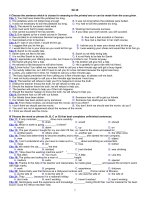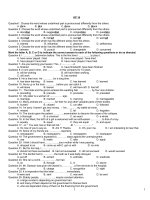Tài liệu luyện thi Đại học Môn Tiếng Anh - The Environment 2 ppt
Bạn đang xem bản rút gọn của tài liệu. Xem và tải ngay bản đầy đủ của tài liệu tại đây (44.34 KB, 2 trang )
NguyÔn §øc Hng*
- Marie Curie School www.my.opera.com/mrduchung
Page
1
Tµi liÖu luyÖn thi §¹i häc
M«n TiÕng Anh
Vocab - The Environment 2
_______________________________________________________________
Exercise 1: Fill in the blank with one suitable word to make a compound.
1) ozone 2) global 3) greenhouse
4) nuclear 5) exhaust 6) acid
Match the compounds with the definitions.
1. the unwanted gases, etc. that are produced when making
nuclear power.
2. the gas that comes from a vehicle’s engine
3. a type of oxygen around the Earth that stops the sun from
harming the Earth.
4. water that falls from the sky and contains chemicals that
damage plants, etc.
5. the way in which the Earth is slowly getting warmer
because gases are stopping heat from leaving it.
6. the way in which the Earth’s weather is getting warmer
because of pollution.
Exercise 2: Complete each sentence with one of the words given.
balance fuels gas lead species
chemicals fumes greenhouse pesticide waste
1) Factories often dispose of ________________ products in rivers and the sea.
2) The chimpanzee is one of many ____________ which will soon be found only in
zoos.
3) The earth’s atmosphere is growing warmer partly because of the so-called
“______________ effect.”
4) Many scientists believe that the natural ____________ of the world’s ecology is
threatened.
5) Over-exploitation of fossil ____________ such as coal and oil will lead to an energy
crisis.
6) Many people prefer to eat fruit and vegetables which have not been sprayed with
_______________.
7) Within a few years, ___________-free petrol will be used throughout Europe.
8) Many household products actually contain _____________ which are harmful to the
environment.
9) In some cities a poisonous smog is created from car exhaust ____________.
10) Another cause of global warming is emission of carbon dioxide ______________
from power stations and factories.
Exercise 3: Complete the paragraph with the words below. Remember to use the
correct form of the verbs.
organic pesticides pollute pollution recycle recycling
SAVING OUR ENVIRONMENT!
Our environment is in trouble. Modern ways of living and today’s industries are
1)
____________ it. Most people think there is nothing they can do. This is not true.
Everyone can do something to help save our environment. Here’s the list of things you
can do:
- Help to cut
2)
____________ by taking the bus to work instead of your car.
- Buy
3)
_________ fruit and vegetables that have not been treated with
4)
_________.
-
5)
________ all your cans, bottles and paper. There should be a
6)
________ centre
somewhere near your home, so take them there.
Exercise 4: Choose the best answer for each sentence below.
1) The fields were flooded after the river burst its
A. banks B. edges C. sides D. parts
2) After the rain, the street was full of
A. floods B. lakes C. puddles D. pools
3) During the storm, the climbers sheltered in a
A. cave B. valley C. cliff D. hole
4) A small runs across the bottom of our garden.
A. river B. stream C. torrent D. sea
5) It was difficult to swim because the were so high.
A. waters B. waves C. tides D. banks
6) From the of the hill you can see the sea.
A. peak B. mouth C. summit D. top
7) You must carry a lot of water when you cross the
A. desert B. plain C. sand D. ocean
8) In the middle of the square there is an old
A. stream B. fountain C. source D. tap
9) I think it is going to rain. It is very
A. clouded B. clouding C. cloudy D. clouds
10) The church caught fire when it was struck by
A. hurricane B. lightning C. thunder D. wind
Exercise 5: Complete each blank with on one suitable word on the right.
NguyÔn §øc Hng*
- Marie Curie School www.my.opera.com/mrduchung
Page
2
1) We cut down the trees but then we had to dig up its
2) The road goes through a beautiful pine .
3) When Tom was eating a cherry, he accidentally swallowed the
4) In autumn, these paths are covered in fallen .
5) Who is going to cut the while I am away?
6) We bought Diana a beautiful indoor for her birthday.
7) A tree fell, and its massive blocked the road.
8) Harry buys and grows all his own vegetables.
9) The birds was carrying a to build its nest.
10) Some people like eating orange .
a) forest
b) lawn
c) leaves
d) peel
e) plant
f) roots
g) seeds
h) stone
i) trunk
j) twig
Exercise 6: Use these words to complete the text.
floods radiation sea level climate
deserts ice caps oceans gases
Scientists have shown that the temperature on Earth is increasing by 0.1
o
every ten
years. That’s one degree every century. The (1) that are produced by
factories and cars are allowing more (2) from the sun to reach Earth. In the
future this will have very serious consequences for humanity.
As the Earth gets hotter, the Arctic and Antarctic (3) will slowly
melt and the level of the (4) will rise. A recent report says that the (5)
will rise by 70 metres over the next hundred years, causing (6)
in many low-lying parts of the worlds.
There will be (7) changes, too. Some areas will become wetter
while others will become much drier. Some areas which today are green and fertile will
eventually turn into (8) . Tropical diseases like malaria will become
common in areas where today they are unknown.
Exercise 7: Match each sentence with the disaster it describes.
A. Fire B. Typhoon C. Earthquake D. Tidal wave
E. Plague F. Volcano G. Drought H. Sandstorm
I. Landslide J. Flood K. Famine
______ 1) Several people were walking along when suddenly tons of earth came
crashing down the hillside and blocked the road in front of them.
______ 2) Over 50,000 people in Ethiopia have died of starvation in the past month.
Questions are being asked concerning the delay in the supplies of rice and grain which
were recently sent to them.
______ 3) The winds have already strengthened considerably and the sea is now very
rough indeed. As a result, ferries across the harbour have stopped sailing and all large
ships have put out to sea.
______ 4) The river overflowed in several places and huge areas of farming land are
now several feet under water. Boats are being used to rescue people in nearby villages.
______ 5) Suddenly the ground shook beneath our feet and the tall building opposite the
college began to sway. Windows and doors rattled, and several bookcases in the college
library came crashing down.
______ 6) Tankers full of water were sent, but it was too late to save many of the
animals and crops there. The whole area was like a vast desert.
______ 7) Smoke poured out of the crater but no one expected an eruption. A week
later, however, red hot lava began to flow down the side of the mountain.
______ 8) It swept onwards, covering everything in its path. The travellers had to get
off their camels and lie down until it had eventually passed.
______ 9) Flames swept through the block of offices, burning everything inside. Two
hours later only the empty shell of the building remained.
______ 10) The first sign of illness was a pain in the chest, followed by a great thirst
and a burning fever. Few medical supplies reached the area and consequently almost all
the victims died.
______ 11) It must have been at least twenty feet high as it swept towards the shore. In
a few seconds it destroyed all the houses in its way, drowning everyone inside.
Exercise 8: Choose the best ending from 1) to 10) for each sentence a) to j).
a. In cities the air is hard to breathe because of car
b. The earth’s climate is changing because of
c. Not having enough of something is called a
d. Air, sea and land can suffer from
e. Throwing things away unnecessarily is called
f. A mixture of smoke and fog is called
g. Things which we throw away are called
h. To avoid wasting things we can use
i. The paper people drop in the street is called
j. Areas with low rainfall often suffer from
1) waste
2) pollution
3) recycling
4) global warming
5) rubbish
6) litter
7) drought
8) exhaust fumes
9) shortage
10) smog









